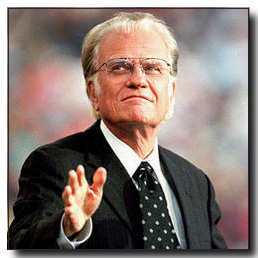Watching Billy and the Pope
- TERRY MATTINGLY
The old voice was shaky and the pre-recorded tape was poor, but the Rev. Billy Graham's words hit home during the recent Nashville tribute to June and Johnny Cash.
 |
Billy
Graham |
"Millions admired him
and adored him, but only a few got into John and June's inner spiritual life,"
said Graham, who shared many a crusade stage with Cash. "He and June are in heaven,
and we are looking forward to seeing them relatively soon."
The words "relatively soon" did not require explanation.
Another American giant will almost certainly be departing soon. There is talk of the world's most famous evangelist returning to London yet again for a 2004 crusade, but few would be surprised if Parkinson's disease prevents those altar calls.
Of course, Graham is too towering a figure to merely belong to America. And the impact of the man some already call Pope John Paul the Great has been too universal to discuss his work only in terms of Roman Catholicism. Both men belong to the ages and to the world.
Scholars and scribes who study religion are bracing for changes that are hard to fathom.
An editorial in The Christian Century asks: "Did a politically shrewd and theologically sophisticated Polish pope trigger the collapse of Communism? Did an energetic and telegenic southern evangelist foster the resurgence of evangelical Christianity in the post-World War II era?" The fact that questions of this magnitude make sense is remarkable, especially in an age that only assigns greatness to sports and entertainment celebrities.
As a journal for Protestant progressives, the Century noted that both men have always had their critics especially on the left. In 1957, mainline theologian Reinhold Niebuhr said Graham's appeal "depends on oversimplifying every issue." The British Council of Churches once said that he uses "all the tricks of the modern demagogue." Catholic pundit Garry Wills has credited Graham with selling "golf-course spirituality" to the powerful.
On the other side of the aisle, fundamentalist Protestants accused the evangelist of fatal compromises with Catholics and liberals and warned that he had become the most "dangerous man" in Christianity.
Pope John Paul II would understand. He has faced similar sniper fire from both directions, with liberals accusing him of crushing dissent while some traditionalists insist he has failed to adequately crack down on dissent.
This is actually a sign of how influential both of these men have been, said historian Mark Noll, who teaches at Graham's alma mater, Wheaton College.
"If a person is getting criticism from radically different points on the ideological compass, at the very least that implies that they have displayed a certain degree of independence and courage," he said. It is also crucial to note that both men "worked on a great and grand stage in times of tremendous change. Billy Graham was not merely a great evangelist. He was the great evangelist at the time when evangelicalism walked onto the world stage."
Graham and John Paul became statesmen and both mastered modern media, noted journalist David Aikman, author of "Great Souls: Six Who Changed the Century." Both built bridges to the thriving churches of the Third World and defended religious liberty worldwide.
The pope's 1989 Vatican meeting with Soviet leader Mikhail Gorbachev was merely one dramatic example.
"You can imagine this scene," said Aikman. "The pope greets Gorbachev in Russian and begins lecturing him IN RUSSIAN on how Christians make great citizens and how their beliefs and values are worthy of respect and even favor. Who knows what that meant to Russia? Who knows what impact words such as that might have in China?"
Who knows if new leaders of this stature will emerge quickly? There will be a papal election and a new pope, noted Noll. But with Graham, there is no way for the diverse and splintered world of evangelical Protestantism to select a true successor. It is a matter of gifts and timing.
"This truly is a case of trying to say 'hail and farewell' as we face the passing of two remarkable men," said Noll. "Everyone knows that this is a moment of great meaning, but no one knows exactly what it means.
"No one knows what will happen next. This is why we struggle for words."
 This is Meaghen Gonzalez, Editor of CERC. I hope you appreciated this piece. We curate these articles especially for believers like you.
This is Meaghen Gonzalez, Editor of CERC. I hope you appreciated this piece. We curate these articles especially for believers like you.
Please show your appreciation by making a $3 donation. CERC is entirely reader supported.

Acknowledgement
Terry Mattingly. "Watching Billy and the Pope." On Religion column Scripp's Howard News Service (November 19, 2003).
All columns are the sole property of the author. Reprinted with permission. Reproduction is prohibited.
The Author
Terry Mattingly writes the nationally syndicated "On Religion" column for the Scripps Howard News Service in Washington, D.C. He is the director and writes for Get Religion. He is also the director of the Washington Journalism Center at the Council for Christian Colleges and Universities. He is the author of the book "Pop Goes Religion: Faith in Popular Culture." In addition to his classroom duties, Mattingly lectures at Gordon-Conwell Theological Seminary in South Hamilton, Mass., the Torreys Honors Program at Biola University, the School of Journalism at the University of Nebraska at Lincoln, Baylor University in Waco, Texas, and in other settings across the nation. Terry Mattingly and his wife Debra have two children, Sarah Jeanne, and Frye Lewis. The Mattinglys are members of Holy Cross Orthodox Church in Linthicum, Md.
Copyright © 2003 Terry Mattingly



